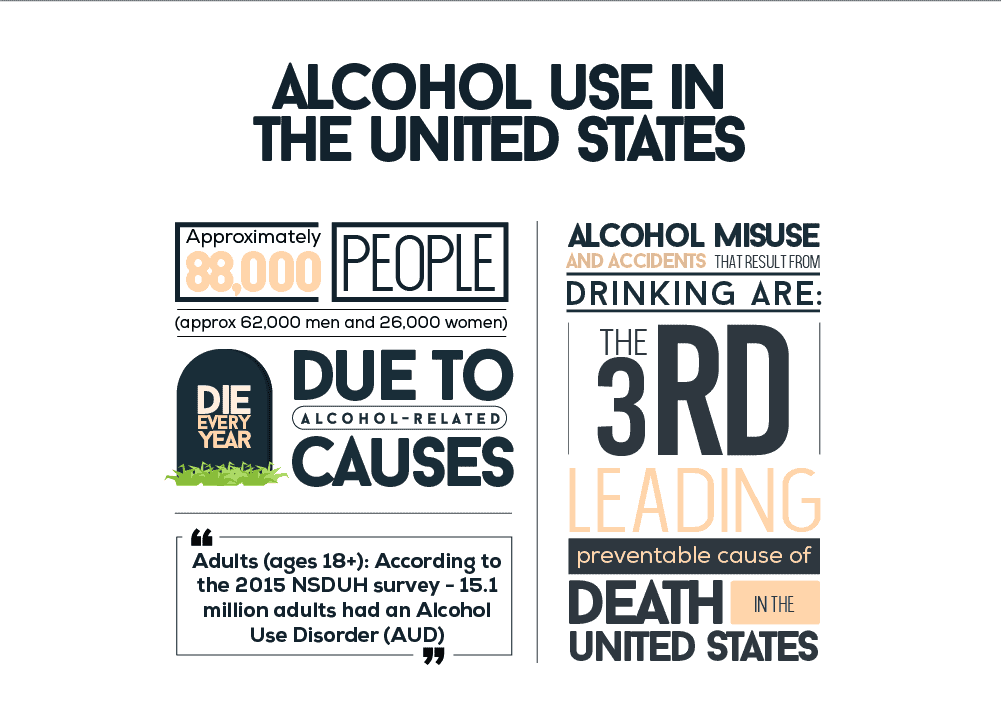 Mixing alcohol and drugs is never a good idea. Whether they are over-the-counter prescription meds or illegal drugs, taking them with booze can have fatal consequences. There’s a reason why prescription medication packages are marked with a “DO NOT MIX WITH ALCOHOL” label—it’s dangerous. Mixing medicine and alcohol can have all kinds of negative side effects. Unfortunately, many people overlook this. Maybe they’re having too much fun at a party and decide to pop a few pills while they’re already drunk. Maybe they take prescription medication and forget that they can’t drink booze. Or, maybe they struggle with alcoholism and are just seeking a stronger high. Whatever the case, it’s important for everyone to know how dangerous it is. After all, when you combine alcohol with some drugs, the results can be deadly. We’ve compiled a list of drugs you should never mix with alcohol in hopes that it could prevent readers from life-threatening effects.
Mixing alcohol and drugs is never a good idea. Whether they are over-the-counter prescription meds or illegal drugs, taking them with booze can have fatal consequences. There’s a reason why prescription medication packages are marked with a “DO NOT MIX WITH ALCOHOL” label—it’s dangerous. Mixing medicine and alcohol can have all kinds of negative side effects. Unfortunately, many people overlook this. Maybe they’re having too much fun at a party and decide to pop a few pills while they’re already drunk. Maybe they take prescription medication and forget that they can’t drink booze. Or, maybe they struggle with alcoholism and are just seeking a stronger high. Whatever the case, it’s important for everyone to know how dangerous it is. After all, when you combine alcohol with some drugs, the results can be deadly. We’ve compiled a list of drugs you should never mix with alcohol in hopes that it could prevent readers from life-threatening effects.
“Why compromise your work and family commitments? Get the help you need from our Outpatient Treatment Program”
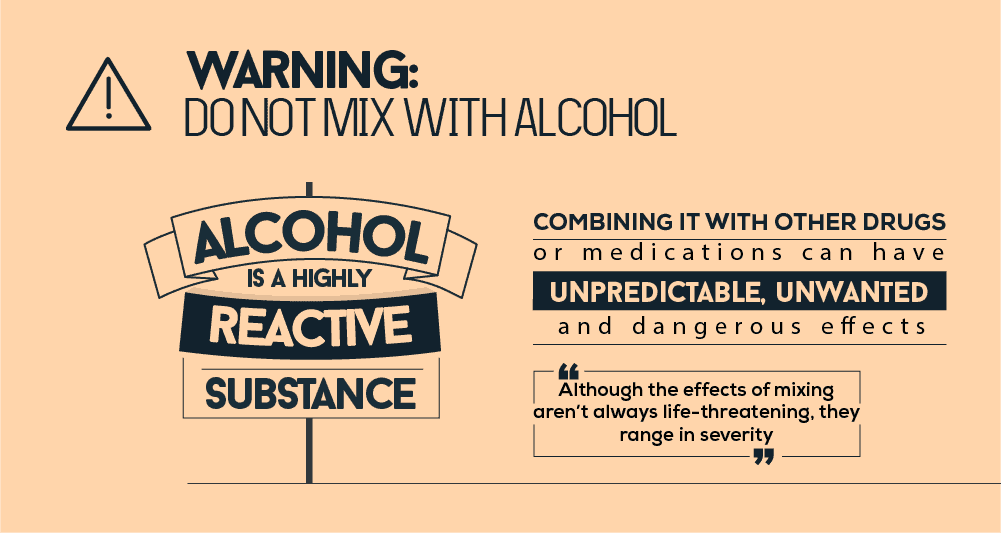
But First…Why is Drinking with Other Drugs so Bad?
Alcohol affects the brain in very complex ways. For example, it increases the production of a brain chemical called GABA. Usually, GABA slows the brain down to help humans make smart, rational decisions. Of course, “smart” and “rational” are not usually associated with getting drunk. This effect is due to the fact that, when the brain has too much GABA in it, it functions extra slowly. That’s why drunk people aren’t always able to move or speak very well. The amount of GABA in the brain is directly linked to other organs. So, as the brain slows down, the heart and lungs slow down, too. Alcohol can’t stop the heart or lungs completely, but other drugs can. When it’s mixed with these other drugs, booze can exacerbate their effects, eventually leading to an overdose. This is just one example of what can happen. Some less severe, but still unpleasant, side effects are described below. What is it that causes alcohol to mix poorly with most medications? How can you avoid these negative interactions? What do you do when you notice a bad reaction to a medication? Read on to find out more about the result of mixing alcohol with various medications and what you should do if you or a loved one suffers negative consequences from a dangerous combination. 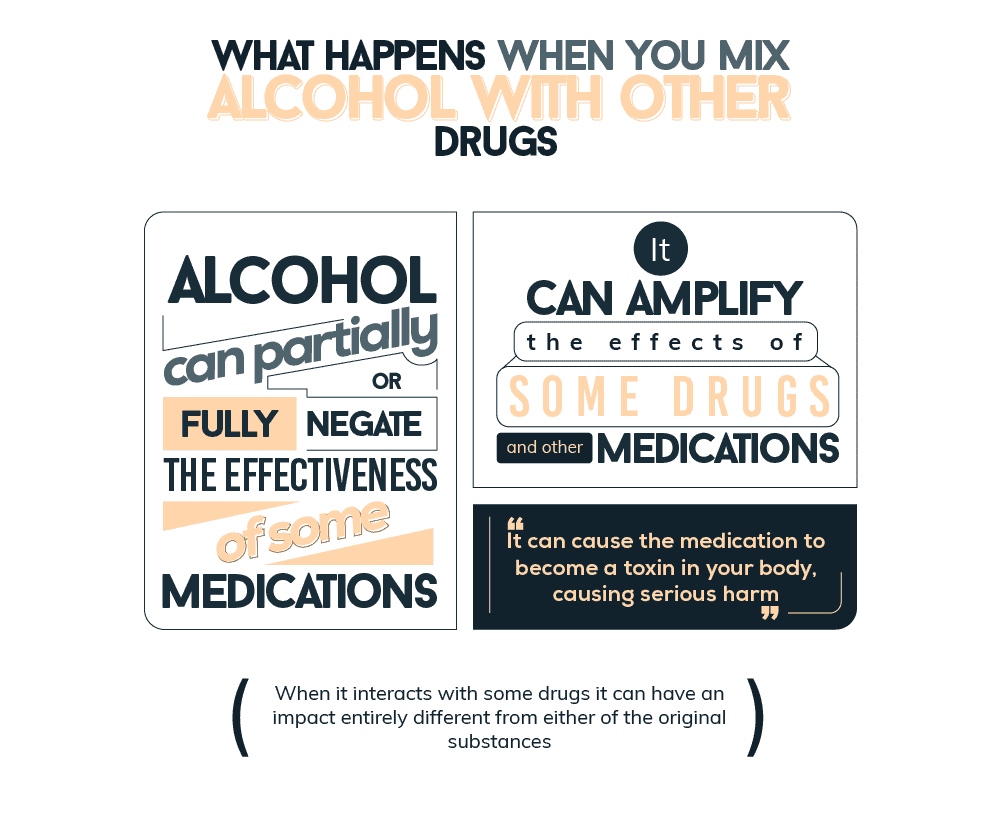
1. General Pain Relief Medication
Nearly everyone has a bottle of pain medication in their home, so we’ll start there. Nyquil, Tylenol, Ibuprofen, Aleve, and other meds should not be mixed with booze. Some might think that the mixture is safe enough, but the results can be dangerous. Of course, mixing Nyquil and alcohol won’t kill anyone. But it can still have some negative consequences over time. Side effects range depending on the exact drug. However, some common ones include:
- Nausea
- Stomach bleeding
- Ulcers
- Liver damage
- Rapid heartbeat
In other words, the user may not overdose. But, the long-term effects can take a toll on the body. 
The Liver Doesn’t Respond Kindly to Drug Cocktails
Drugs and alcohol put the liver under a lot of stress. It’s the liver, after all, that’s responsible for processing all of these substances. See, the human body recognizes drugs as poison. So, when someone ingests them, it works extremely hard to process and expel them. Basically, it wants them out as fast as possible. That’s why long-term alcoholics usually have liver problems at some point in their life. But, Nyquil and Excedrin are drugs, too. The body isn’t exactly built to handle medication like that. Like liquor, it also puts the liver to work. Therefore, if someone mixes these two drugs on a regular basis, they may have some liver damage in the future. It can take years for the liver to repair itself, so avoid this mixture whenever possible.
“Get the help you need today. We offer outpatient assistance, so you can maintain your work, family, and life commitments while getting the help you deserve!”
2. Opioid Painkillers
Opioids are deadly on their own. Drugs such as Percocet, Vicodin, Demerol, and Fentanyl kill thousands of people each year. But, many people forget just how dangerous these drugs are. If they’re prescribed, it’s easy to see them as another over-the-counter medication. This is not the case. Those who use these drugs for medicinal reasons are strongly advised against drinking Results may include:
- Severe drowsiness
- Extreme dizziness
- High risk of overdose
- Breathing difficulty
- Impacted motor functions
- Memory problems
- Liver damage
Painkillers are able to help some folks cope with chronic pain. However, there’s no excuse for mixing alcohol and painkillers. 
The Signs and Symptoms of an Overdose
If someone has mixed booze with painkillers, they should be closely monitored. Those around them should look for the following symptoms:
- Confusion or deliriousness
- Vomiting
- Slowed or irregular breathing
- Bluish lips
- Cold skin
- Seizures
- Unresponsiveness
These are all signs of an overdose. If left untreated, the individual may face brain damage, prolonged heart and lung problems or death. It’s crucial that they are taken to a hospital as fast as possible in order to prevent a tragedy.
3. Muscle Relaxers
Muscle relaxers can be dangerous, too. Especially when mixed with booze, drugs like Flexeril, Valium, and Soma can do some damage to the body. Their relaxing effects are similar to that of opioids. Their risks are similar, too. If someone mixes Flexeril and alcohol, for example, they put themselves at risk of:
- Respiratory damage
- Lapsed memory
- Impacted motor functions
- Liver damage
- Overdose
Under the Controlled Substances Act, Valium and other muscle relaxers are classified as Schedule IV substances. This means that they’re not considered to be very addictive. However, that doesn’t mean that they’re not dangerous. Our advice is to keep them far away from booze. 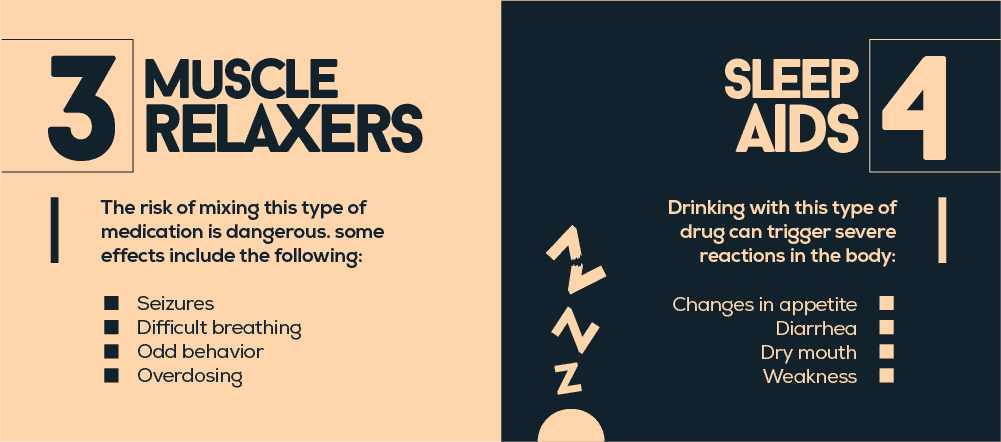
Why Flexeril and Alcohol Cause Respiratory Damage
By itself, alcohol doesn’t cause lung damage. However, many other drugs do. As it was pointed out above, respiratory depression is a common cause of overdose. Muscle relaxants, along with opioids, target the part of the brain that regulates the central nervous system. The CNS runs the full length of the body from head to toe. It’s connected to nearly every organ. As the CNS slows down, it triggers the respiratory system to slow down, as well. Of course, this can have deadly results if it drops to an unsafe level. Even if the user doesn’t overdose, however, they may still have difficulty breathing. Adding booze to the mix can make this effect even worse. Once the drugs have left the user’s system, their breathing should return to normal. However, if the user constantly forces their lungs to speed up and slow down, their respiratory system may suffer over time. In certain people, like addicts, the lungs may slow down to a point that is hard to come back from.
4. Sleep Aids
Sleeping aids like Ambien, Lunesta, Prosom, Sominex, and Restoril are not particularly dangerous on their own. Of course, no one should drive a car or operate machinery while they have a sleep aid in their system. And, they cause some people to have weird dreams. Overall, though, they’re safe to take under normal conditions. However, when alcohol is added into the mix, their side effects heighten. The mixture is unlikely to cause an overdose, but it can still have some unwanted effects. These include:
- Drowsiness
- Dizziness
- Breathing difficulties
- Impaired motor skills
- Memory trouble
It is possible for people to develop Ambien addictions. If someone is mixing their sleeping pills with alcohol, then, it could be a sign of a larger problem.
“We accept many health insurance plans. Take a look at our Outpatient Program.”
5. Cough Syrup
Cough syrup and alcohol are not friends. Medications like Delsym and Robitussin actually depress the respiratory system. They do this in order to block the cough reflex in the respiratory tract. This function enables the user to stop coughing for a period of time. Of course, respiratory depression can be dangerous. If cough medication is taken under safe circumstances, it’s fine. However, mixing it with alcoholic beverages is unsafe. Some side effects include:
- Dizziness
- Drowsiness
- Breathing trouble
- Increased risk of overdose

Wait…Doesn’t Cough Syrup Have Alcohol in It?
Some cough medications contain trace amounts of alcohol. However, it is usually listed as an “inactive ingredient”. This is because the alcohol contained in cough syrup is used to dissolve other ingredients. It’s not enough to get someone drunk by itself (unless they drink a large quantity). However, many recovered alcoholics choose to avoid these medications for that reason. Just because it contains trace amounts, though, does not make it safe to mix.
6. Lithium and Other Mood Stabilizers
Mood stabilizers are powerful medications. As their name suggests, they help to regulate moods in people with chemical imbalances. They’re used to treat conditions such as bipolar disorder and manic depression. Popular mood-stabilizing medications include Depakote, Eskalith, and Lithobid. These are all brand name products that contain the chemical lithium. The interaction between lithium and alcohol is unhealthy. When these two chemicals mix inside the body, they may cause:
- Drowsiness
- Dizziness
- Restlessness
- Tremors
- Joint pain
- Muscle pain
- Liver damage (Depakote)
- Increased depression
- Irregular bowel movements
- Nausea and vomiting
- Impaired motor functions

Why Mixing Depakote and Alcohol is a Bad Idea
Depakote and other lithium-based drugs are designed to restore balance in the brain. Essentially, bipolar disorder and manic depression stem from an imbalance of certain neurotransmitters, or brain chemicals. When there is too much, or too little, of certain chemicals, the brain is unable to achieve stability. So, lithium and other mood stabilizers regulate neurotransmitter production to help people feel stable. The problem is that alcohol ramps up the production of these chemicals. One of these chemicals, dopamine, make us feel quite good. But, people with bipolar disorder don’t always need more dopamine. In fact, sometimes they need less. When lithium and alcohol interact, they can counterbalance each other. Someone who mixes the two may find that their mental state gets worse as result. This side effect occurs on top of the physical side effects listed above.
7. Wellbutrin and Other Antidepressants
Antidepressants are among the most popular drugs in America. According to the Centers for Disease Control and Prevention, roughly 12.7% of Americans take antidepressants on a regular basis. The most common antidepressants include Celexa, Cymbalta, Effexor, Prozac, Seroquel, Remeron, Risperdal, Wellbutrin, and Zoloft. It is highly recommended that patients avoid alcohol while taking these drugs. Side effects may include:
- Severe drowsiness
- Increased depression symptoms
- Impaired motor functioning (Seroquel and Remeron)
- Heightened effects of alcohol (Wellbutrin)
- Potential for liver damage (Cymbalta)
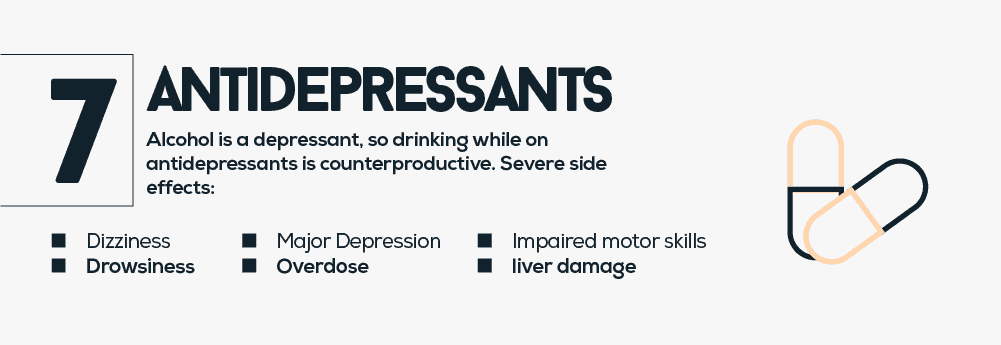 Mixing alcohol and Wellbutrin or a similar medication can make depression worse. In extreme cases, some patients who mix these drugs become unexpectedly aggressive. As the purpose of these meds is to reduce depression symptoms, it makes no sense to mix. Additionally, doctors advise against mixing alcohol and St. John’s Wort. This natural supplement has antidepressant effects, so the mixture may be negative.
Mixing alcohol and Wellbutrin or a similar medication can make depression worse. In extreme cases, some patients who mix these drugs become unexpectedly aggressive. As the purpose of these meds is to reduce depression symptoms, it makes no sense to mix. Additionally, doctors advise against mixing alcohol and St. John’s Wort. This natural supplement has antidepressant effects, so the mixture may be negative.
8. Adderall and Other ADHD Meds
ADHD medications are a type of stimulant. Drugs such as Adderall, Concerta, Strattera, Ritalin, and Vyvanse work to help people focus better. They do so by stimulating the central nervous system. This occurs when the drugs enable an influx of dopamine and norepinephrine to enter the brain. 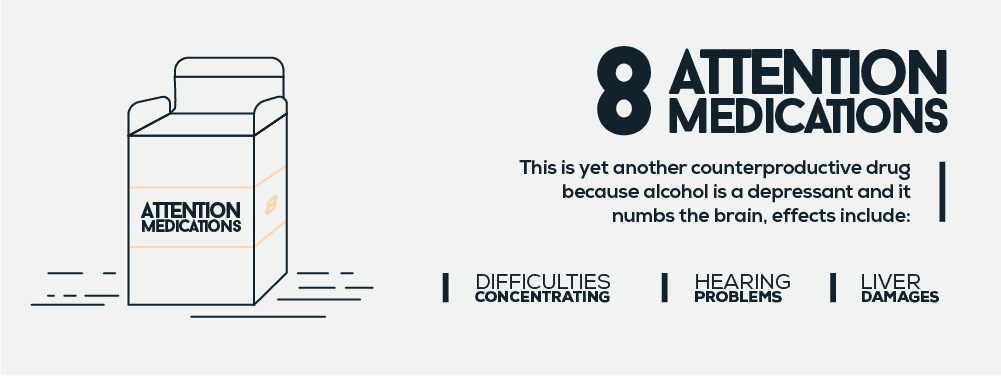 Because alcohol also generates dopamine in the brain, it should never mix with ADHD meds. The user may feel high for a while, but the after-effects are unpleasant. For example, those who mix Vyvanse and alcohol often find that the medication stops working. This applies to other ADHD meds, too. Additionally, the combination can increase blood pressure, generate insomnia, and cause seizures. Therefore, folks on ADHD medication should avoid alcohol.
Because alcohol also generates dopamine in the brain, it should never mix with ADHD meds. The user may feel high for a while, but the after-effects are unpleasant. For example, those who mix Vyvanse and alcohol often find that the medication stops working. This applies to other ADHD meds, too. Additionally, the combination can increase blood pressure, generate insomnia, and cause seizures. Therefore, folks on ADHD medication should avoid alcohol.
9. Anxiety Medications
There’s a strong connection between anxiety and alcoholism. A lot of anxious people love drinking because it helps them feel at ease. The connection between these conditions is so strong that the two are often diagnosed as co-occurring disorders. Anti-anxiety medications don’t mix well with booze, though. So, if someone takes Xanax, Valium, Ativan, or Klonopin, they should avoid drinking. The mixture can have negative side effects. These effects include:
- Dizziness
- Drowsiness
- Slowed breathing
- Impaired motor skills
- Memory trouble
- Overdose
What Happens When You Mix Xanax with Alcohol?
Anxiety meds belong to a family of drugs called benzodiazepines, or “benzos”. Benzos are not the same as opioids or muscle relaxers, but that do share some traits. Like opioids and alcohol, benzos are depressants. They eliminate anxiety by slowing down the part of the brain it stems from. In turn, they also slow down the central nervous system. As we’ve learned, overdoses occur when the CNS slows down too much. So, if someone mixes anxiety medication with alcohol, they put themselves at serious risk of overdosing. If a person is unable to avoid drinking while on medication, it could be a sign of addiction. Whether they’re addicted to booze, prescription meds, or both, they should seek treatment. 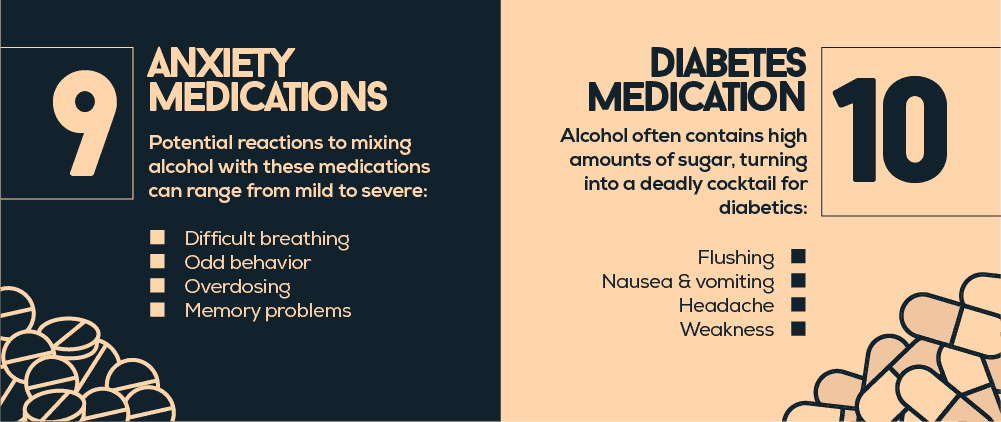
10. Diabetes Medications
Diabetes and alcohol don’t go well together. While diabetics are able to drink under certain circumstances, their drinking habits should be closely managed. This isn’t because alcohol has abnormal amounts of sugar in it, either. In fact, that’s a myth. Aside from extra-sugary drinks like margaritas, alcoholic beverages have very little sugar in them. Drinking alcohol actually lowers the amount of sugar in a person’s blood. But, as any diabetic knows, this is dangerous. This problem worsens when an individual has diabetes medication in their system. Drugs such as Glucotrol, Glynase, DiaBeta, Orinase, and Tolinase are all designed to regulate blood sugar levels. If someone suffers from high blood sugar, for example, the medication might lower it. When mixed with alcohol, then, these medications can cause deadly side effects. Some potential side effects include:
- Weakness
- Rapid heartbeat
- Headache
- Nausea and vomiting
- Flushing
11. Arthritis Medications
Arthritis meds work to reduce inflammation in the joints. This makes it easier for patients to move around without pain. Also, helps to slow down the speed at which the disease spreads through the body. For this reason, drugs such as Celebrex, Naprosyn, and Voltaren are a godsend to arthritic people. Those who take these drugs, however, should not drink alcohol. While it’s unlikely for the mixture to result in an overdose, it is unhealthy for the liver and stomach. In order for the medication to work properly, the liver needs to be in tip-top shape. And mixing these meds with alcohol can cause stomach bleeding, too. So, it’s important to avoid this. 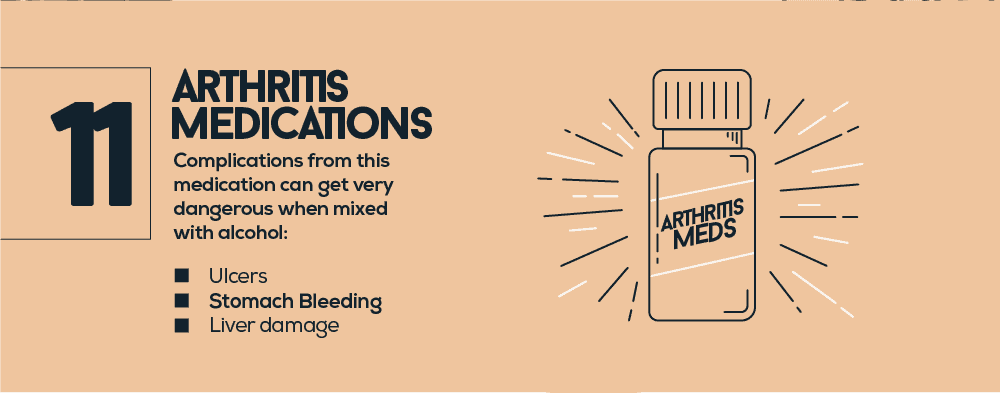
How Long After Taking Voltaren Can I Drink Alcohol?
Voltaren is a prescription medication used to treat arthritis. It’s also prescribed for severe migraines and other forms of chronic pain. The drug comes in a few different forms including pills, gels, and injections. Each form has a different half-life, which means that it stays in the system for a longer or shorter period of time. The term “half-life” describes how long it takes for the body to eliminate 50% of the total quantity. The half-life of Voltaren injections, for example, is between 1 and 2 hours. So, after around 90 minutes, half of the total amount will flush out. If someone takes only one dose of the drug, then, the could presumably drink after 3 or 4 hours. But, hardly anyone takes just one dose. After all, these meds are intended for long-term use. In order to drink alcohol, then, the individual needs to wait long enough for the drug to leave their system entirely. In order to determine how long this period is, they should consult with their doctor and avoid drinking in the meantime.
12. High Cholesterol Medications
There are a number of drugs designed to help lower cholesterol. Some of the brand-name products include Advicor, Crestor, Lipitor, Pravigard, Vytorin, and Zocor. Statins are popular, too.  While each product is different, many high cholesterol meds are known to have negative side effects. For example, statins are shown to cause liver inflammation. The problem is so bad that doctors often advise long-term alcoholics to avoid drinking. Alcohol, of course, causes damage to the liver over time. So, drinking while on statins is doubly bad for the liver. People who mix their high cholesterol medication with booze probably won’t overdose. But, their liver won’t be very happy, either.
While each product is different, many high cholesterol meds are known to have negative side effects. For example, statins are shown to cause liver inflammation. The problem is so bad that doctors often advise long-term alcoholics to avoid drinking. Alcohol, of course, causes damage to the liver over time. So, drinking while on statins is doubly bad for the liver. People who mix their high cholesterol medication with booze probably won’t overdose. But, their liver won’t be very happy, either.
13. Allergy Medication
Allergy medications are known to cause drowsiness. That’s why the labels on Benadryl and Sudafed packages warn against driving when they’re in the system. Mixing Benadryl or Sudafed with alcohol, however, takes that drowsiness to the next level. The mixture has a depressant effect on the central nervous system. As all of these drugs are depressants, they can really slow the CNS down. As was made clear above, a depressed CNS can result in overdose. 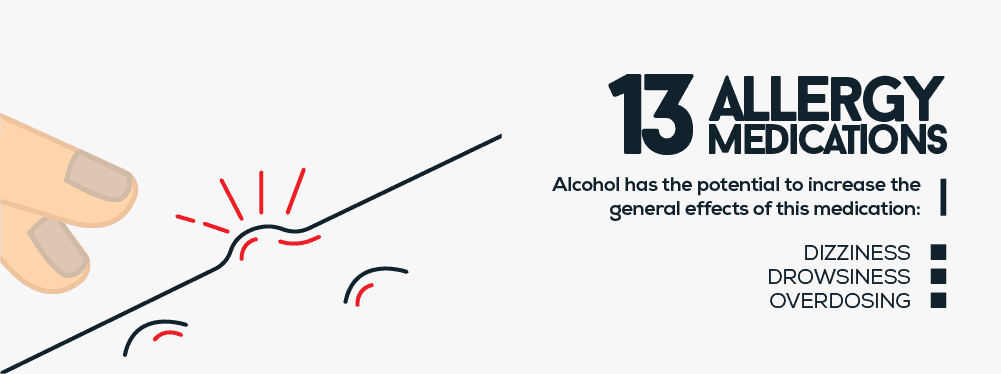
Can You Take Claritin with Alcohol?
Like other allergy medications, Claritin is a depressant. It’s not commonly associated with sleep, however, so many folks overlook this. As a result, it should not be mixed with alcohol. The combination can cause extreme drowsiness. It also increased the risk of overdose.
“We treat both addiction and co-occurring disorders and accept many health insurance plans. Take a look at our outpatient program today!”
14. Marijuana
As marijuana becomes more commonplace, people often forget how to use it safely. After all, just because it’s legal doesn’t mean that it’s the safest drug in the world. It can still be abused. It can still lead to addiction. And it still has negative interactions with other drugs. 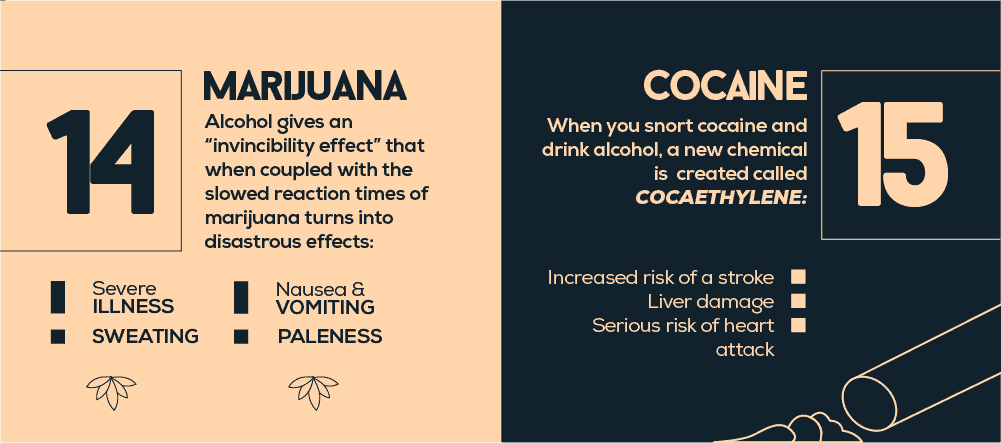 One drug that it interacts with in a negative manner is alcohol. Mixing marijuana and alcohol can be dangerous, especially under certain circumstances. If someone attempts to drive with a mix of alcohol and weed in their system, for example, the results could be fatal. Additionally, marijuana is shown to prevent vomiting. So, a drunk person who needs to throw up may not be able to. This probably won’t kill anyone, but it can cause them to feel much sicker.
One drug that it interacts with in a negative manner is alcohol. Mixing marijuana and alcohol can be dangerous, especially under certain circumstances. If someone attempts to drive with a mix of alcohol and weed in their system, for example, the results could be fatal. Additionally, marijuana is shown to prevent vomiting. So, a drunk person who needs to throw up may not be able to. This probably won’t kill anyone, but it can cause them to feel much sicker.
15. Cocaine
It’s common for coke-users to do lines while they’re drinking. But, many people overlook just how dangerous the mixture is. When someone mixes cocaine and alcohol, the two drugs form a new, third chemical inside the body. This chemical is called cocaethylene. Cocaethylene can cause heart attacks, even in young people. It’s also extremely bad for the liver. The chemical actually attaches to the liver and builds up over time. In the long run, an excess of it in the liver can cause some serious damage.
Drinking Alcohol Makes It Harder to Detox from Coke
Cocaine detox is already a difficult process. It can take several days, or even a week, for a cocaine addict to complete withdrawals. But, those with a habit of mixing coke and booze have a harder time detoxing. Because the cocaethylene binds to the liver, their body has difficulties flushing it out. A healthy liver is essential to a smooth detox. So, if someone constantly mixes these two drugs, their withdrawals can last much longer.
“Addiction has no social or economic boundaries, anyone can be affected. Learn more about our Outpatient Rehab Program and how it can help you or your loved one.”
Can’t Help Mixing Drugs and Alcohol? It Could Be Time to Get Help
Certain drugs should never mix with alcohol. As we’ve shown above, the results can be deadly. However, millions of Americans mix up drug-and-alcohol cocktails on a daily basis. If someone can’t help themselves, it could be a sign of larger problems. They might be addicted to drugs, alcohol, or both. There’s a lot of help out there for addicts. So, if you find yourself consuming unsafe mixtures, call us. We can discuss your partying habits, discuss treatment options, and point you in the right direction.
Frequently Asked Questions
Why is it Dangerous to Mix Drugs With Alcohol?
What is Polysubstance Abuse?
How do I Know if I Have an Addiction?
- Struggling to stop using your drug(s) of choice, even though you might have a desire to quit.
- Continuing to use drugs and alcohol even though you are having serious health or mental health issues as a result.
- Feeling as though you need to use substances because they help you cope with your problems.
- Becoming obsessed with using drugs and alcohol and finding that they dominate your thoughts.
- Taking risks to obtain your drug(s) of choice as well as while you are under the influence of them.
- Taking a large dose when you start the day so you can feel the effects faster.
- No longer participating in activities or hobbies that you once enjoyed.
- Making sure you always have a good supply of drugs and/or alcohol on hand. You may also have stashes hidden around your home.
- Keeping your substance abuse behaviors a secret from the people you care about.
- Denying that you have a problem because you believe you can quit anytime.
- Using drugs or drinking in excessive amounts.
- Having legal issues because of your substance abuse.
- Struggling financially because of the amount of money you spend on drugs and alcohol.
You may also find that you have some physical symptoms of addiction as well. For example, you might start to go through withdrawal when you have not used in a while. You may also find that you need to use larger amounts in order to have the same effects. This is called forming a tolerance.
Is it Dangerous to Mix Ecstasy With Alcohol?
- Feeling anxious.
- Getting dehydrated easily
- Risky behaviors
- Becoming depressed
- Acting aggressively
- Problems sleeping
- The potential for liver and kidney damage
- The potential for cardiac arrest
If You are Addicted to Drugs and/or Alcohol, do You Need Treatment?
What Did you Think About This Blog?
Give it a Rating!
